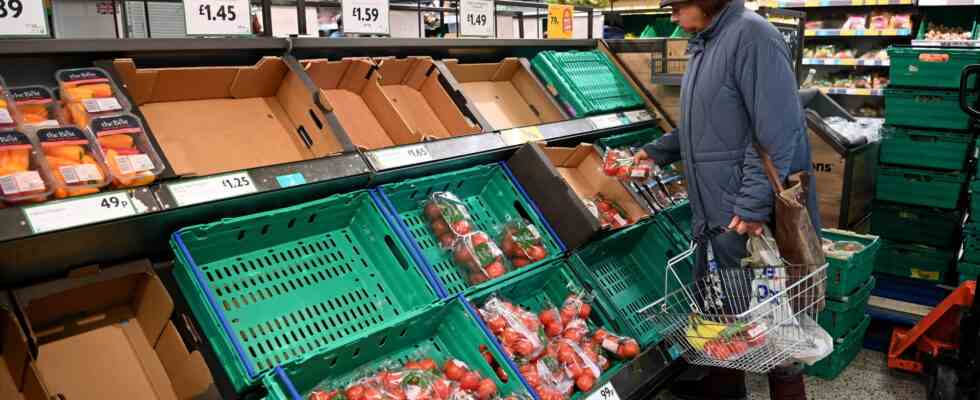As of: 02/22/2023 7:03 p.m
In the UK, several supermarket chains are restricting the sale of some vegetables due to supply problems. There should be a limit for cucumbers and tomatoes at the market leader Tesco and at Aldi.
In many British supermarkets, customers are currently standing in front of empty vegetable shelves. Tomatoes, cucumbers and peppers in particular are in short supply. Many supermarkets restrict the sale of vegetables.
Aldi and Tesco also imposed restrictions on consumers, following their competitors Asda and Morrisons. The reason is crop failures in southern Europe and North Africa, hamster purchases are apparently to be put a stop to.
The market leader Tesco and Aldi only have three cucumbers and a strict limit on tomatoes and peppers per customer, as the BBC reported. It is a precautionary measure. Asda, number three on the British market, had also imposed restrictions – which also apply to salads and cauliflower, for example. At the competitor Morrisons, there are only two units per customer.
In many British supermarkets, customers are currently standing in front of empty vegetable shelves – like here in London.
Image: REUTERS
Problems could still persist
The broadcaster Sky News reported that the largest British tomato grower APS Produce warned of shortages until at least the end of April. The British Farmers’ Association had previously warned of falling domestic food production.
The retailers blame extreme weather in Spain and North Africa, which destroyed large parts of the harvest. The UK relies heavily on imports during the winter. Around 95 percent of the tomatoes are imported from December to March.
Several factors are driving prices up
Food prices in Great Britain have increased significantly, mainly because of Brexit. The companies incurred higher costs due to customs controls, which they passed on to consumers. In addition, the staff shortage worsened – so there are significantly fewer harvest workers than before the EU exit.
The Russian war against Ukraine also drove prices up sharply. Domestic farmers use greenhouses much less frequently due to higher energy prices. The UK imports much of its fresh food from the EU.
Climate change is also causing problems for farmers. In the summer of 2022, for example, Great Britain suffered from a heat wave and in December from a long, hard frost. Because of the bad weather, carrots, parsnips, cabbage and cauliflower have been affected, said Tim O’Malley of British food producer Nationwide Produce. He expects further price increases.
So far no bottlenecks in Germany
According to a survey by the dpa news agency, there are no comparable bottlenecks in Germany so far. Germany’s largest food retailer Edeka emphasized: “We can continue to ensure that our markets are supplied with sufficient quantities.” The discount subsidiary Netto made a similar statement.
The Rewe Group, to which the discounter Penny also belongs, emphasized: “There are enough tomatoes & Co. to buy at Rewe and Penny. Also in the future.” However, the supply disruptions in the procurement market would affect the range of supply and prices. The discounter Lidl assured: “Due to the long-term partnerships with our suppliers, the supply of goods to the Lidl branches is basically guaranteed despite the current bottlenecks in the regions mentioned.”

